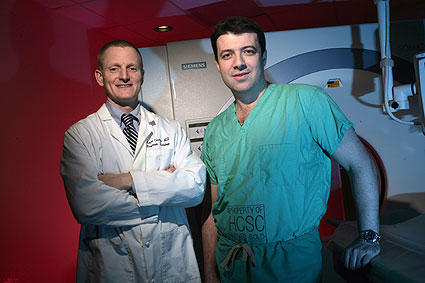CT Scan
What Is a CT?
Computed tomography (CT) is also known as Computed Axial Tomography (CAT). The CT machine resembles a large doughnut with a sliding table that moves slightly during the exam. The CT exam is a painless procedure and the technology is a sophisticated x-ray procedure. The CT technology uses an advanced computer to compile multiple images of cross-sectional pictures (slices) taken during the scan of the area of the interest. By using this technology to generate images of tissue, bone and blood vessels our specialized Radiologists can visualize and interpret any visual abnormalities present.
What Is a CT Used for?
CT scanning has the ability to image and compile a combination of soft tissue, bone, organ and blood vessels to detect medical problems. It is an invaluable tool for staging and detecting cancer.
Other applications include diagnosis and treatment of:
- Heart disease
- Stroke
- Evaluation of vascular diseases
- Assessment of traumatic injuries
Some of the Exams We Offer
 MMCSC is a dedicated stroke center offering early detection and treatment
of stroke in the region. The CT department is staffed by our specially
trained and certified CT technologist that provides care 24 hours a day
seven days a week.
MMCSC is a dedicated stroke center offering early detection and treatment
of stroke in the region. The CT department is staffed by our specially
trained and certified CT technologist that provides care 24 hours a day
seven days a week.
The MMCSC CT Department is fully accredited by the American College of Radiology (ACR) to provide CT imaging services.
Preparation
- The patient is instructed by the scheduling counselor not to eat or drink several hours prior to the test.
- The CT technologist informs the patient about the exam and gives instructions about the procedure.
- The patient is asked a few questions about their medical history and whether they have any allergies.
- The patient is then placed on the CT table and the exam is performed.
- Depending on the ordered exam, the patient may be required to drink oral contrast 2 hours prior to their exam. The oral contrast allows the area of interest to better visualize the underlying medical problems for the interpreting Radiologist.
- The requested exam may also require an intravenous injection of contrast material which is administered by the Radiology nurse (RN) during the scanning process. The IV injection can enhance and delineate the area of the study for the Radiologist.

Frequently Asked Questions
How long will the CT exam take?
Depending on the exam once the patient is placed on the table the exam can take from fifteen minutes to a half an hour to complete.
What is oral and intravenous contrast?
Depending on the exam and what you’re ordering physician requested, the patient may be instructed to drink oral contrast approximately 2 hours prior to the exam. Using oral contrast the interpreting Radiologist will be able to determine the underlying medical problem.
Intravenous contrast is used to highlight blood vessels and to enhance the structure of organs like the vessels of the brain, neck, heart, aorta, kidney, liver, spleen and pancreas. The contrast is contained in a special injector which is administered by our certified and highly qualified Radiology nurses. During the procedure the CT technologists will be constant contact with you during your exam.
Getting Your Results
Your CT images will be analyzed by a radiologist, a physician who specializes in CT testing. The radiologist will send a signed report which includes an interpretation of the image to your primary physician. Your physician will receive your results soon after. At MMCSC we also offer our patients a free copy of their exam on CD to share with their physicians.
Our Team of Specialists
Our board certified Radiologists are specially trained to diagnose and interpret the images. At MMCSC the CT technologists are specially trained in the theory and practice of CT procedures and operate the equipment used during the procedure. The technologists are board certified (ARRT, CT) and the MCSMC is fully accredited by the American College of Radiology.
